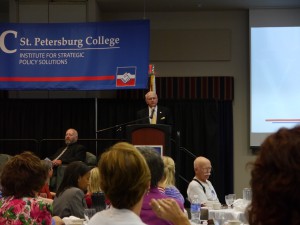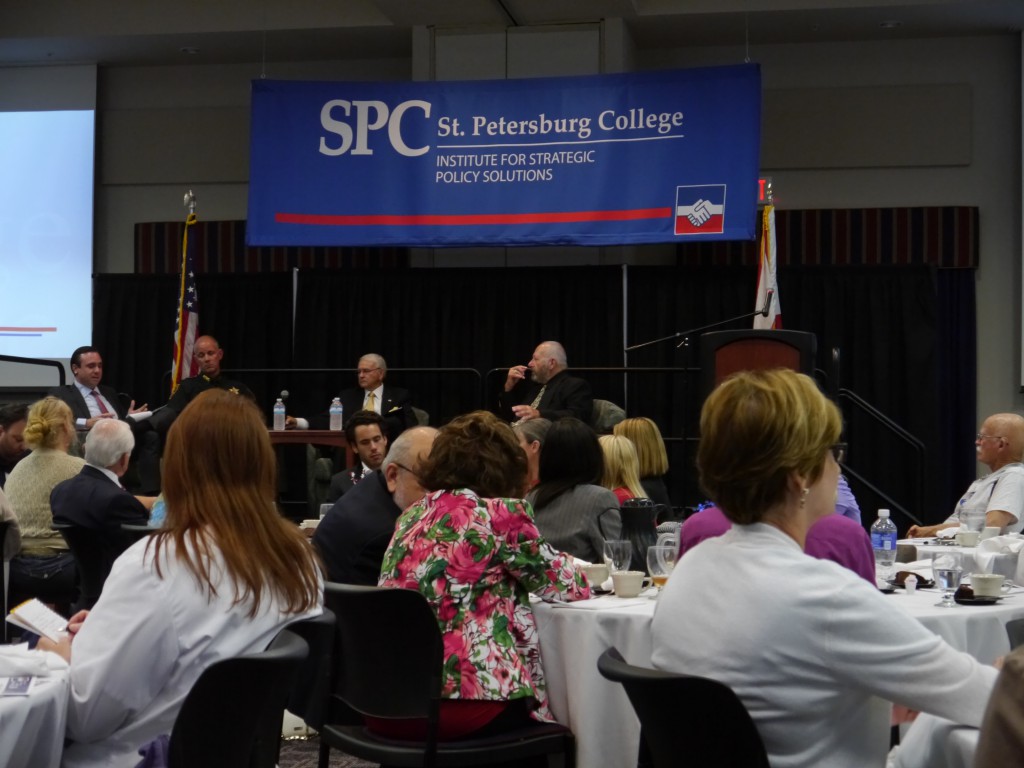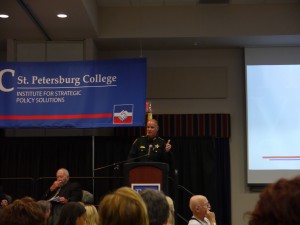
Medical Marijuana Debate Comes to SPC Seminole
News & Politics April 21, 2014The smoldering debate on Florida’s medical marijuana referendum, Amendment Two on this year’s ballot, came to Seminole campus at the SPC Institute for Strategic Policy Solutions Village Square on Thursday, 17 April.
A panel of experts took the stage to plead their case to the audience. The panel included Pinellas county Sheriff Bob Gualtieri, United for Care campaign manager Ben Pollara, and Dr. Carlton E. Turner, former Assistant to President Ronald Reagan and Director of the Office of National Drug Control Policy. The discussion was moderated by Craig Kopp of WUSF Public Media, and host of All Things Considered. In the audience that evening was Cathy Jordan, a Lou Gehrig’s disease sufferer, whose home was raided by Manatee county law enforcement in 2013 for her use of medical marijuana, and former House district 13 candidate Alex Sink was also in attendance. The audience ranged from students in their late teens to senior citizens. The discussion saw the return of the Institute’s polling software, which allowed members of the audience to answer questions for or against the proposition from their mobile phones, or computers provided by the college. The polls showed overwhelming support for the referendum. Before opening statements by the panelists, the undecideds led with 44 percent, but those in favor had a clear lead over the opposition with 39 percent; only 17 percent were against the referendum. Despite strong support, this would not be enough to pass the referendum which requires 60 percent of voters to approve the measure.
The moderator gave a sense of the scope of the issue, Mr. Kopp has covered stories on marijuana since the beginning of his career as a journalist in 1974. He provided the ballot language, and said that after a long career in radio “the idea of civil discourse is very appealing to me.” Mere moments after his introduction, the discussion caught fire as Ben Pollara began his seven-minute opening statement.
Pollara said “patients should be able to pursue their doctor’s recommendation without becoming a criminal,” a point that he returned to throughout the night’s discussion. He praised Sheriff Gualtieri, but had nothing good to say about Dr. Turner. Pollara said that Turner’s arguments did not merit consideration, pointed to his role in the Reagan administration’s anti-drug campaigns in the 1980s, and asked the audience how they thought “Just Say No” had worked out. Dr. Turner was visibly offended by Pollara’s comments as he took the microphone for his seven minutes.

Dr. Carlton E. Turner angered the audience when he said “marijuana lowers your sperm count!”
An agitated Turner led off talking about his past conflicts with the National Organization for the Reform of Marijuana Laws (NORML), an advocacy group that has been promoting the legalization of medical and recreational use of marijuana since 1970, and called marijuana “a crude drug.” He went on to say “marijuana makes your sperm count go down,” which drew calls of “no!” from the audience, and closed stating that there were safer alternatives to medical marijuana.
Sheriff Gualtieri agreed with Turner on that point as he began his opening statement. “THC is what kills pain,” Gualtieri said. He declared that taking THC in a pill is a preferable alternative to smoking marijuana. He went on to say that 54 thousand people in Oregon use medical marijuana for minor complaints, not severe conditions. He expressed concern that children would get ahold of marijuana, and that it would cause the same problems as pill mills do. Like Turner, he believes the ballot language is open to abuse. Gualtieri said that the ballot amendment is about money, and a stepping stone to legalizing marijuana. Despite holding a broadly similar stance to Dr. Turner, the audience remained respectfully quiet during his opening.
At the end of the opening statements, the polls were opened again. They started heavily in favor of amendment two. Guests were encouraged to discuss the issue at their table during a short break.
Each table had a seat reserved for a student facilitator, placed there by the Institute to promote discussion. Students from the Seminole campus Student Government Association and ethics classes were in attendance. This reporter was seated with four men and one woman. The four men were familiar faces from previous Village Square events, but the woman stated that this was her first. Opinion at the table strongly favored amendment two. One said that those opposing the amendment have a financial interest, that drug prohibition funds law enforcement budgets and prison construction. He compared drug prohibition to alcohol prohibition in the early 20th century, and said that it was similarly ineffective. Another said that he lost more friends in Vietnam than were harmed by marijuana. Thomas Lally, a long-standing Village Square veteran, said that Dr. Turner poisoned the audience against him in his opening statement. The woman remained undecided on the issue. Adjoining tables showed a similar pattern, with the majority in favor with a minority of undecided or opposing voices. That showed when the polls closed at 74 percent in favor, 17 percent against, and 9 percent undecided.
After a tumultuous question-and-answer period in which the moderator had to step in many times, the audience was presented with a four-variable poll asking under what conditions they would approve of the legalization of marijuana. The first answer was under no conditions, the second was in non-smokable form for medical use only, the third was in any form for medical use only, and the fourth was in any form for medical and recreational use. At the close of the polls, in any form for medical use weighed in at 43 percent, medical and recreational at 36 percent, in non-smokable form for medical use at 11 percent, and under no conditions at 9 percent.
After the end of the debate, I asked Sheriff Gualtieri and Dr. Turner if there was a question they wish the audience had asked. The sheriff said “no, I feel that the audience vetted the issue well, and that everything came out that needed to come out.” Dr. Turner began to say that it wasn’t his job to tell the audience what to ask and stopped, then said “I needed to explain the difference between different cannabis products, I should have done that in the discussion.”
This event was covered on our live events account on Twitter, @SandboxSocial, follow us for live coverage of events at SPC and around Tampa Bay.


